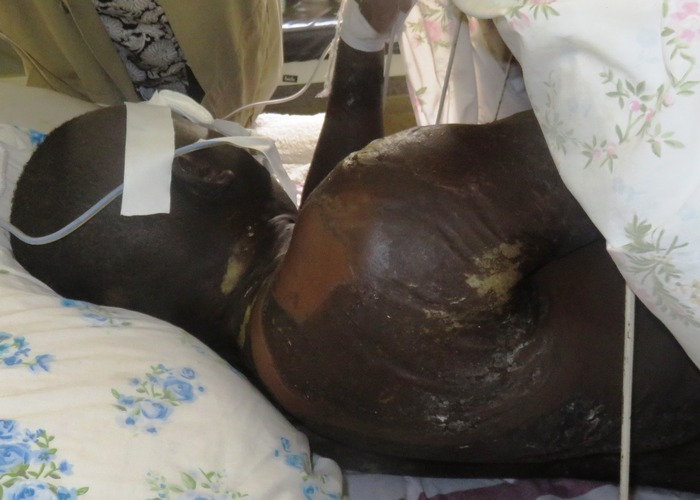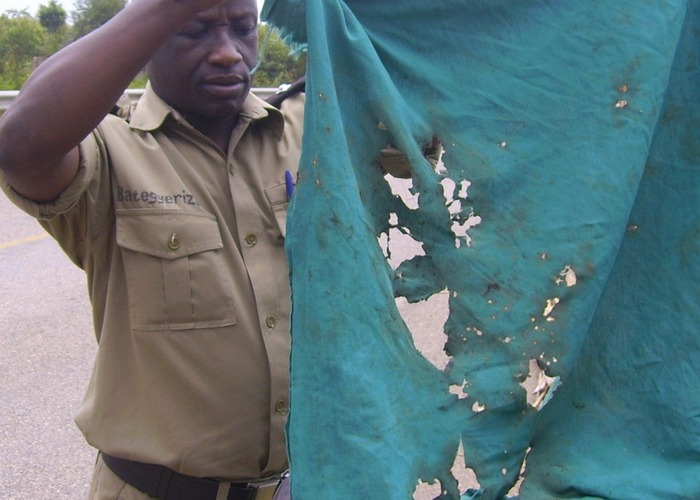Fresh acid attacks in Greater Masaka region
Acid violence is an offense punishable in the Penal Code Cap 120. According to Sec.216 (g) perpetrators of acid or burn violence intending to maim are liable to life imprisonment.
Southern Police Spokesman, Lameck Kigozi. Photo by Davis Buyondo
ACID ATTACKS
MASAKA - Police and other security agencies have cautioned the public to be alert in the wake of fresh acid attacks in the Greater Masaka region.
The most recent incident occurred Tuesday last week at Nyendo village in Masaka Municipality, leaving John Bosco Ssemujju, 39, admitted in critical condition.
He was attacked upon reaching home at around 9pm. He is said to have been followed by unknown people who poured acid on him.
Neighbours responded to his alarm but he had already sustained severe burns on his head, face, and back. Others tried to follow the assailants but they disappeared in the cover of darkness.
Ssemujju was rushed to Kitovu Hospital where he has been admitted since. His condition is still critical.
 Acid attack victim, John Bosco Ssemujju, 39, admitted at Kitovu hospital.
Acid attack victim, John Bosco Ssemujju, 39, admitted at Kitovu hospital.
Dr. Vincent Twijukire said they are doing what is possible to save his life.
Residents said he is a peaceful man and his attack could have been sparked from a different agenda.
Detectives collected exhibits from his compound including a jerrycan which contained acid.
In the meantime, police has not yet arrested suspects in connection to the gruesome incident.
Lameck Kigozi, the Southern Police Spokesman, said investigations kicked off and they are still pursuing the assailants. He explained that Ssemujju was attacked near his home.
A doctor at the Masaka regional referral hospital defines acid as any corrosive substance that can cause bodily harm or that can disfigure or maim a casualty.
He added that acid may lead to death depending on the content and nature of damages.
Alleged cause of attack
Ssemujju is a brother to Patrick Kintu Kisekulo, the Kyotera LC5 Chairperson. According to him, the incident could be politically engineered.
"Someone may seem to do revenge on me through my siblings and I request police to investigate this matter with care," Kisekulo said.
Kisekulo suspects some political personalities to be behind his brother's attack, but declined to point out anyone.
This may be the first acid attack in the region this year, but several happened last year.
In September 2018, a jilted man hired two people to attack and disfigure Sharifah Nankalubo, a shopkeeper, with acid. The incident happened at Kakooma trading centre in Kalisizo rural, Kyotera district.
Eyewitnesses told police that the two accomplices arrived on a motorcycle at around 8pm. One of them went to the shop, pretending to buy cigarettes.
In the process, he poured acid on Nankalubo leaving her in critical condition. Bystanders chased him, caught him and beat him up. Police arrived to rescue him from a mob that wanted to burn him alive.
The suspect was admitted at St. Cecilia Medical Centre in Kyotera Town to receive treatment, but he mysteriously escaped. He was rearrested a few days later.
In 2015, Anthony Bukenya,35, a solar and electronics dealer in Kakuuto Sub-county, Kyotera district, attacked his own parents and siblings with acid.
 Police officer displays one of the clothes burnt at Bukenya's parents' home.
Police officer displays one of the clothes burnt at Bukenya's parents' home.
The incident happened at Kalivaliyo village. Parents survived with minor injuries only because he missed the target. It is alleged that trouble stemmed from misunderstandings over family property.
Regulation on acid
Acid violence is an offense punishable in the Penal Code Cap 120. According to Sec.216 (g) perpetrators of acid or burn violence intending to maim are liable to life imprisonment. And should an acid attack committed with "malice aforethought" lead to death, then it is considered murder (Sec.188) and is punishable by death (Sec.189).
Reena Ntoreinwe, the Administrator- End Acid Violence Uganda, an NGO working to end acid violence and empower acid attack survivors, also explained the Toxic Chemicals Prohibition and Control Act was passed in 2015.
However, she added, they still have concerns regarding that law as an organization. "The law focuses on all chemicals putting less focus on acid," she said.
She told New Vision that there is no official statistics about the number of victims. She added that the acid issue has not been taken seriously yet attacks still happen.
"Our organization's current database has approximately 500 cases. These are compiled with the help of police," she noted.
2011 Situational analysis report
Acid violence is a significant crime in Uganda, with devastating consequences for victims, their families and society. This is according to the 2011 report by Acid Survivors' Foundation Uganda.
The report says acid violence rarely kills, but it almost always leaves victims with severe physical, psychological and social scarring, and leads to social stigmatization, the break-up of families, poverty and destitution.
"Attackers usually target the head and face in order to maim, disfigure and blind. Victims are often left with no legal recourse, limited access to medical or psychological assistance, and without the means to support themselves," the report says.
Cost and accessibility
The concentrated sulphuric acid is mainly intended for car batteries. This chemical is available at petrol stations and garages. However, street sellers and other outlets, are the primary agent used in assaults.
A mechanic at Nyendo garage in Masaka said, for as low as sh2,500 and sh3,000, one can buy a liter of dilute acid adding that the concentrated can cost above that.